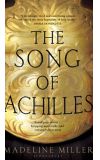
01 Nov 2011 10:10:29
The past year has seen an outpouring of such Homeric reimaginings and fillings-out, such as David Malouf's novel The Ransom, based on book 24 of the Iliad; and Zachary Mason's Calvino-esque sequence of riffs on the Odyssey, imagining dozens of counter-fates for its central character. Now Miller, in her page-turning debut novel The Song of Achilles, brings us the boyhoods of Patroclus and Achilles. She is a respectful and clearly loving reader of Homer: nothing strikes a false note in her intricately created world at the court of Achilles' father Peleus, where ordinariness and wonder (centaurs, goddesses) are woven together without jerkiness. She nails her colours to the mast, too: Miller has her Achilles and Patroclus inseparably, gloriously and physically devoted, which certainly makes sense to this reader.
Where I lose her is when, instead of sticking to prequel, she forges on through the parts of the Trojan war described in the Iliad. Alas, the best of writers will stumble in comparison to the master. The scene in which Priam and Achilles meet in book 24 of the poem, the Trojan king stealing silently through the Greek camp to beg the hero for the corpse of his son, is one of the most moving, and dreadfully balanced, passages in all literature. There is no redemption here, nor forgiveness; anger pulsates beneath a surface gentleness. There is something else, too: an acknowledgment of shared suffering and shared humanity. But Miller, having started so well, has Priam say to Achilles, "Thank you for your hospitality", and "I am sorry for your loss". This is the bathetic stuff of the suburban dinner party.
With Chapman and Pope, and in the modern age Robert Fitzgerald and Robert Fagles, there is no shortage of English translations of the Iliad. Stephen Mitchell – who has also translated Gilgamesh, the Bhagavad Gita, the Tao Te Ching and the Book of Job – provides the latest (417pp, Weidenfeld & Nicolson, £25). He cites Matthew Arnold's advice to Homeric translators, to be "eminently rapid" and "eminently plain". "My intention," Mitchell writes, "has been to recreate the ancient epic as a contemporary poem."
To make familiar, or to make foreign? That is one of the many dilemmas of the Homeric translator. For my taste, Mitchell's version – while pacy and direct – is overfamiliar. The poems are grand; to use Arnold's description, they have nobility. I dislike Mitchell's technique of sometimes removing the poem's "Homeric epithets". (I mean the stock of often-repeated descriptive phrases, such as the "wine-dark" sea and Achilles "of the swift feet", which were probably used as metrically prefabricated units by the early oral bards who improvised these stories.) These phrases often simply fill out the metre and are irrelevant to the context, he argues. I think they do more than he gives them credit for. And in any event, I missed their delicious archaic tang. To me, they are one of the great pleasures of the poem.
Alice Oswald has stripped down the Iliad more radically, and more successfully, in her 80-page poem Memorial (96pp, Faber, £12.99). It is subtitled: "An Excavation of the Iliad", and described in her author's note as a "reckless dismissal of seven-eighths of the poem". Except it does not feel reckless at all, but precise and scalpel-sharp. The poem begins with a list of those characters killed in the course of the Iliad. This goes on for nearly eight pages. It is a catalogue of death, with the inscribed starkness of a war memorial. Some are just names; some, like Hector, the last name and the endpoint of Achilles' death-rampage, tug the heart.
The poem continues with Oswald wrapping words around each of these deaths; the words are Homer's, but refracted through her own lucent poetic imagination. She stitches into this unadorned fabric some of the glorious similes of Homer: those that imagine a peaceful, pastoral world away from the deathly field of war; or sometimes those that summon up something more dangerous. "Like fire with its loose hair flying rushes through a city / The look of unmasked light shocks everything to rubble / And flames howl through the gaps." As a reading of Homer, its ferocity of intent reminded me of Simone Weil's essay "The Iliad, or the Poem of Force". But it is also an exquisite and brutal thing taken entirely on its own terms. It's a major achievement.

